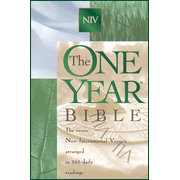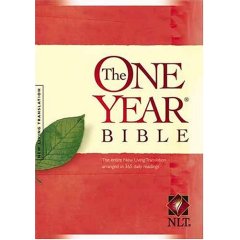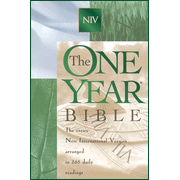The One Year Bible- May 31, 2006

Have you ever had one of those days where things just don’t go your way? You know what I am talking about; get up late, bad traffic, spill coffee on your shirt. I have had a few of those myself. But then there are those days where everything seems to go right; the sun is shining, work flies by, everything seems right with the world. King David sure had his ups and downs in his life too. But every time he seems to be up, something happens to knock him down again. I think that is one reason people like David. He seems to go through some real problems in his life and we all can relate. This week has been up and down for me. I can relate to life’s roller coaster. Let’s see if we can gain some insight from God’s Word this week....
The over arching theme for this week in the life of David is once again DRAMA!! That guy is just a lightning rod for trouble. He never seems to catch a break, and when he thinks things are going well, he does something stupid and gets himself into trouble. The prophet Nathan is there to try to keep the king in line, but he is not always successful. We do catch a glimpse of the good side of David in his dealings with Jonathan’s son Mephibosheth. David loved Jonathan and he missed his best friend very much. David found out about Mephibosheth and wanted to show him kindness. Now Mephibosheth was crippled and needed help. I will go as far to say that if David is a type of Christ then the relationship that David has with Mephibosheth is similar to our relationship with Christ. He seeks us out to show kindness to us and we are the crippled ones in need of help. Because of the kindness of David Mephibosheth eats at the banquet table of the king. The same will happen for us one day; we will eat at the heavenly banquet table prepared for us. The rest of the story could be the plot of a bad Lifetime movie or a daily Soap Opera. We have incest and rape, rebellion and fornication, murder, and treason. Hollywood does not have to look far to see some shady storylines. I think one of the overlooked points of the story is that because of sin there will be consequences. David sinned when he had an affair with Bathsheba. He sinned when he had Uriah killed. These were just a few of the sins of David. Nathan comes to confront David and David realizes his sin and asks for forgiveness. This is the occasion when David penned Psalm 51. If you don’t remember it, look it up right now and read it before you continue on with the study.....seriously........read the Psalm.................O.K. now that you are back you read that David asked for forgiveness and God has promised to forgive those who repent and ask for forgiveness. So, David is a forgiven man but why do all these bad things still happen to him. Well there was a little caveat from the Lord, “Because of what you have done, I will cause your own house hold to rebel against you. I will give your wives to another man before your very eyes, and he will go to bed with them in public view (which happens later in the story, YUCK!)....because you have shown utter contempt for the LORD by doing this, your child will die.” (2 Samuel 12:11,14 NLT) There are consequences for sin. We should not fool ourselves in believing that just because we are forgiven, our lives will be without problems. We will constantly struggle with sin and its consequences until the day we are taken to heaven.
Two things to highlight this week; first of all, Jesus spends a lot of time talking about sending the comforter or advocate after he leaves. This is a direct reference to the Holy Spirit. The Greek word is parakletos. In my Greek dictionary I found this definition:
We will be finishing up the book of 2 Samuel this week and we will see the end of David’s reign and beginning of Solomon’s reign. Here are the vital stats for 1 Kings:
PURPOSE: To contrast the lives of those who live for God and those who refuse to do so through the history of the kings of Israel and Judah
AUTHOR: Unknown. Possibly Jeremiah or a group of prophets
We will also be finishing the Gospel of John and we will get into the book of Acts. Here are the vital stats for the book:
KEY VERSE: “But you will receive power when the Holy Spirit comes on you; and you will be my witnesses in Jerusalem, and in all Judean and Samaria, and to the ends of the earth” (1:8).
John 15:4-5
John 16:33
John 17:21
John 18:5-8
Psalm 119:105
John 18:36





